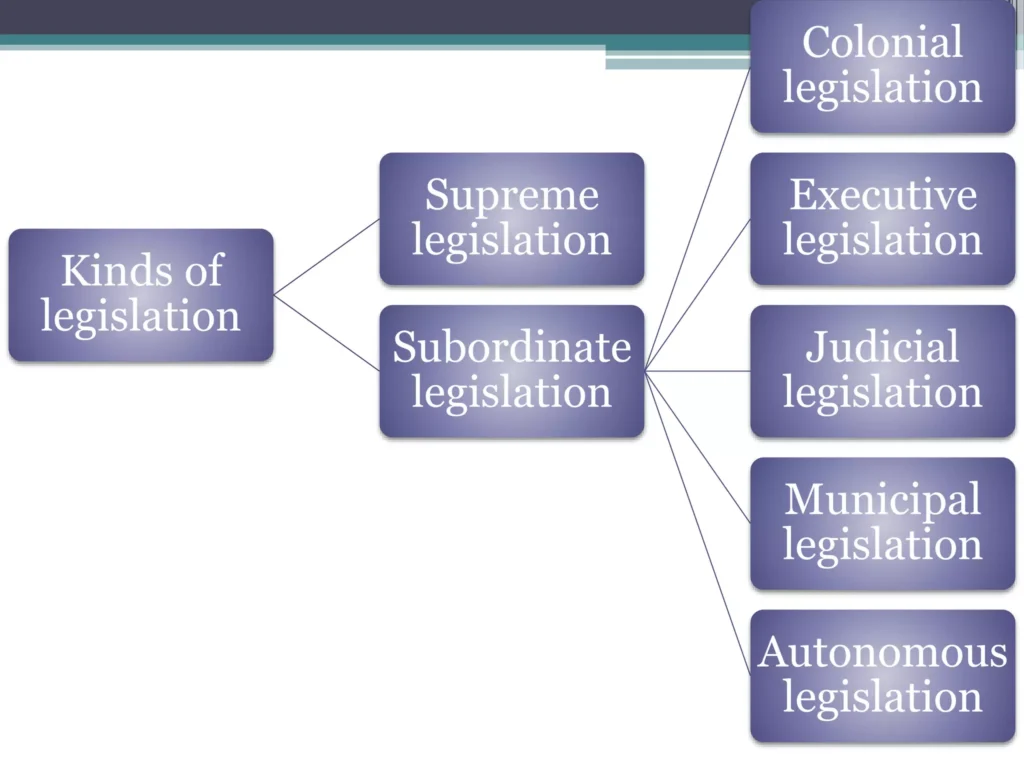Introduction
Legislation, derived from the Latin terms “legis” (law) and “latum” (making), signifies the process of lawmaking. Renowned jurists like Salmond and Austin have defined legislation as the creation of law by a competent authority or the sovereign power that society must adhere to. The process of legislation is often seen as stringent, with a single body endowed with the authority to make laws, and limited scope for alterations.
Types of Legislation
When enacting legislation, the welfare and best interests of citizens should be at the forefront. Legislation can be categorized into two primary types: Supreme Legislation and Subordinate Legislation.

Also Read: Sources Of Law | Meaning and Types
Supreme Legislation
Supreme legislation is enacted by the head of the state and is not subject to control or checks by any other state authority. This type of legislation is powerful and unassailable. In India, the Parliament embodies supreme legislative authority, even amidst various constitutional changes. Supreme legislation remains inviolable, unrepealable, and unconstrained by any subordinate authority.
Subordinate Legislation
Subordinate legislation is created by an authority other than the supreme organ of the state. It operates under powers delegated by the supreme authority, making its legitimacy and reasonability dependent on the supreme power. Unlike supreme legislation, subordinate legislation can be annulled by the supreme authority. Subordinate legislation can further be divided into five types:
Colonial Legislation
Laws made by colonies or territories under another state’s control are subject to the supreme legislation of the controlling state.
Executive Legislation
Legislative powers are delegated to the executive branch, allowing it to execute laws and manage the organization.
Judicial Legislation
Powers are given to the judiciary to create and enforce laws independently, ensuring transparency and avoiding government interference.
Municipal Legislation
Local bodies such as Municipal Corporations and Panchayats are empowered to make by-laws for local matters, functioning within their respective jurisdictions.
Autonomous Legislation
Laws made by autonomous bodies empowered by the supreme authority, such as railways and universities, to manage specific areas of administration.
Advantages of Legislation as a Source of Law
- Effectiveness: Legislation clearly delineates the roles of the legislature and judiciary, ensuring distinct functions.
- Declaration: Laws are made known to the public even before their enactment, ensuring transparency.
- Abrogative Power: Legislation allows for the amendment or repeal of outdated laws, a power not possessed by other sources.
- Superior Form: Legislation is structured, concise, clear, easily accessible, and comprehensible.
Demerits of Legislation as a Source of Law
- Rigidity: Unlike precedents, legislative laws are not flexible and adaptable to changing circumstances.
- Overemphasis on Wording: The importance placed on precise wording can lead to significant issues if any wording is flawed, necessitating comprehensive revisions.
Conclusion
Legislation remains a crucial source of law, providing a codified framework for society. Despite its few drawbacks, such as rigidity and dependence on precise wording, the advantages of legislation, including effectiveness, clarity, and the ability to amend outdated laws, make it an indispensable part of the legal system. In modern times, legislation’s role as an authoritative source of law is undeniable, offering a structured and reliable method of lawmaking compared to other sources like customs and precedents.
FAQ’s
1. What is the difference between supreme legislation and subordinate legislation?
Supreme legislation is enacted by the head of the state and is not subject to control by any other authority. Subordinate legislation is created under the powers delegated by the supreme authority and can be annulled by it.
2. What are the advantages of legislation as a source of law?
Legislation provides clear and effective laws, ensures transparency, allows for the amendment of outdated laws, and is structured, concise, and easily understandable.
3. What are some drawbacks of legislation as a source of law?
Legislation can be rigid and inflexible, and it places excessive importance on precise wording, which can lead to issues if any wording is flawed.
Also Read: Custom As A Source Of Law In Jurisprudence
Reference: manupatra.com